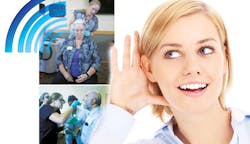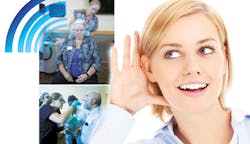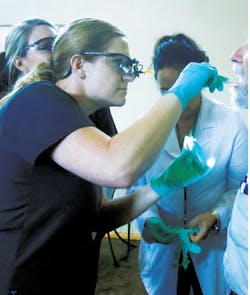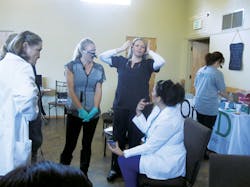A check for 'abnormalities.' Organize outreach programs that focus on a broader screening effort
Organize an outreach program that focuses on a broader screening effort rather than just screening for oral cancer
By Kyle Isaacs, RDHEP, BHS, and Debbie Zafiropoulos, RDH
Are you burned out? Do you experience Sunday night hypertension? Are you tired of the same ol' rigmarole? Have you ever wanted more from your professional life? Have you felt frustrated knowing the only patients that are able to gain from your care, knowledge, and dedication are patients that pay cash or have insurance?
Have you ever wondered what you could do to make a difference in the life of someone without access to care? For a long time, this is what Kyle Isaacs, RDHEP, was wondering. While working in a private practice caring for patients with discretionary money or insurance, a voice kept bugging her with this question. Kyle frequently found herself thinking, what about all the people who cannot afford care?
Kyle tried to silence her inner voice by volunteering once in a while. She did not think about doing anything more about this nagging idea until one day she read about a big two-day event in Atlanta offering free dental care for those in need. It was then that Kyle decided she would organize something similar. (That is until she volunteered at CDAcares in San Jose, Calif., and witnessed the enormity of tackling such an undertaking!)
A few years passed and Kyle's career led her to another state. her voice reappeared and the whisper in her ear was now louder and almost relentless. Kyle decided that now was the time and she set out to create a plan of action and focus on an event that would serve her new community and raise awareness about the importance of oral health and overall health. Driven and excited Kyle set out on her mission! Full of ideas, visions and aspirations it was then Kyle realized she had no idea how to start, who to ask, where to do it, and more importantly would anyone even show up?
Thankfully, Kyle has met many dynamic people throughout her career, and she decided to reach out to her colleague, Debbie Z. Sabatini. Debbie is an amazing mentor, a great idealist, and a passionate health advocate. Even though Debbie lives in Florida and Kyle lives in Oregon, they agreed that distance and time differences would not stop the objective to work together on this project and quickly committed to each other that they would do their best to create an opportunity to not only serve the community of Corvallis, Oregon, but to learn from the process of organizing such an event and make it duplicable for the future.
After talking with Debbie and experiencing her passion and desire to help, Kyle decided she wanted to go forward with organizing a screening day for the Oregon community. Kyle knew from their very first conversation that not only would the community benefit, but she would benefit as well. Debbie and Kyle talked strategy and what the event would look like and defined what the ultimate goal would be. Debbie reassured Kyle that she would be there to offer support and to contact companies she worked with to contribute to the event. Raising awareness and education was our focus. They made lists and had weekly accountability calls to each other to build toward the date.
At first Kyle thought small, thinking that she could have a table by herself in a local pharmacy where she would offer screening to the customers who passed by. With Debbie's mentoring and gentle persuasion, the two realized that by inviting other types of health professionals, they could offer a variety of screenings which meant more opportunities to educate the public and perform more health screenings in one visit. With that vision, the First Corvallis Health Fair and Abnormality Screening event was born.
Debbie and Kyle communicated at all hours- day and night, between patients, and after work. The emails and text messages were endless as the ideas were mounting. They continuously created lists and reviewed them until they were able to prioritize and agree on a set of realistic goals, creating a plan of action. With Debbie's encouragement and experience in organizing events like this across the country, Kyle realized she could do this! She told herself over and over again that this was really happening and was thrilled that she could once and for all silence that inner voice and prove to her that she could plan a dynamic community event that focuses on education and early detection by identifying health risks and providing screening opportunities for abnormalities before they cause permanent or chronic disease.
For the first step, Kyle and Debbie were lucky to secure a beautiful community hall at the Corvallis Evangelical Church. Next, they created flyers to raise awareness for the event. They recruited volunteers from the local Altrusa chapter who were so excited to help. They were a godsend as they took over and helped with setup, making coffee, serving snacks, and enthusiastically supporting this inaugural event. Kyle continually asked for referrals and contacted other health professionals in the community and was fortunate to have two nurses from Project H.E.R. who taught the MammaCare Method of breast self-exam, and a health navigator who helped uninsured citizens of Corvallis sign up for much needed health care.
Debbie flew in all the way from Florida to launch the event by presenting her HPV program and demonstrating her tactile and visual cues of her SOSA™ Screening for Oral and Skin Abnormality protocol for all that were in attendance. Debbie also taught us about maximizing technology and demonstrated the proper use of the OralID fluorescent screening device and the best way to communicate to the patient about the examination so not to instill fear and for them to be proactive and do self-examinations in between physician visits. The attendees were mesmerized. It was like the weight of an elephant was lifted with Debbie's every word of coaching- the guilt, shame and fear disappeared as Debbie shifted the examination of not looking for cancer into shifting our exams to finding abnormalities before they cause chronic damage. It all began to make more sense. Everyone was pumped up, invigorated and ready to screen to save lives!
At this point, you maybe wondering why we are referring to what we do as an "Oral and Skin Abnormality screening," (SOSA) and not an oral cancer screening. Here's the reason. Debbie shared it with all of us at the lecture she led the night before the event (as she does in her popular seminar, "HPV, it's not the hanky panky virus the media says it is. SOSA screening for the health professional and the community we serve." She explains that when we do an oral cancer exam on a patient we cannot say that with 100% certainty that we do or do not see cancer. That would be irresponsible-our fingers and eyes do not diagnose and for a lack of a differential diagnosis we would drive the false negative or false positive rate of cancer through the roof.
Instead, we should be educating patients about self-examination, the value of screening for abnormalities and prevention. With Debbie's expertise, she effectively narrows down our objectives to five principles: "We are responsible for looking for and identifying any red flags or abnormalities that would cause pain, infection, inflammation, loss of tooth or loss of life." Once these are identified and confirmed with the physician in charge, we can effectively refer a patient for definitive diagnosis via whatever pathology technology is appropriate.
Finally the day came. We got up, dressed, made sure we had our coffee, and set off to put up handmade road signs and tie up balloons to draw attention to the event. The question loomed-and neither one of us said it aloud to avoid jinxing our hard work-we silently wondered, "Would anyone come?"
Yes, whooohooo! A great number of people showed up! Some were curious; some needed food and a warm drink to diminish the chill in the air. We met so many amazing and very appreciative people. Some got emotional that we cared enough to open the church for them and offered them an opportunity that they would not otherwise not be able to afford. Along with conducting SOSA screenings on every person, we took blood pressure readings and took advantage of our captive audience to educate them about oral health. We were also able to give them samples so generously donated by several companies and they loved them! We spoke to them about the importance of seeking care and doing as much as they could to do self-examinations, practice preventive oral care routines and to make smart choices when it came to food, drink and recreational activities.
The day was full of nonstop activity. At the end of the day, all of the volunteers were exhausted. The feeling of accomplishment was still flying high as they drove back to Kyle's farm. Over a delicious dinner, they began structuring the POA (plan of action) for the next event and cheered and celebrated in what they just accomplished. Exhausted they both fell into bed and drifted off to a deep sleep, feeling grateful for all the people who made the event even better than they planned and grateful for the bond that two caring dental health professionals had cemented after a chance meeting at RDH Under One Roof.
As with any endeavor, some things worked great, and others did not go as expected. Overall, the event was amazing. Debbie said from the beginning that it would be a learning experience and that we would grow and build from it. They learned a lot throughout the whole process and Kyle is already planning the next one with the hopes of having adjunct health professionals performing diabetes screening, dermatologic skin checks, and smoking cessation education!
Planning a SOSA event can be what you want it to be. That is, you can make it small and intimate by setting up a table at a local health fair, store front at a health club or pharmacy-the options are limitless. Be creative, ask questions, ask everyone for help and be open to all sorts of possibilities! You too can create your own event like Kyle did.
So what's next for you? Are you ready to step outside of your comfort zone and be open to some gentle persuasion as Kyle was with Debbie's coaching? It may seem like an insurmountable feat, but Kyle proved it could be done and you can too!
Most important, don't forget to say thank you to everyone who helps make the event successful. Everyone wants to feel acknowledged, from the lady who made homemade soup to the volunteers who drove 90 minutes to learn how to do an optimized SOSA screening. And, most of all, do not ever, ever, ever give up! You never know if the one person you see be the one that you help.
Good luck and let Kyle or Debbie know how they can support you! RDH
Author's Note:
Debbie and Kyle would like to publicly thank the following for supporting our event: Corvallis Evangelical Church; Altrusa of Corvallis; Crown Seating for donating a saddle stool; OralID for loaning OralID devices; AirTechniques for donating surface and hand disinfectants and sanitizer; Young Dental; CariFree; Dr. Kutsch for his amazing book and samples; OralED Institute for ongoing support and leadership; Mike Heffernan with Halyard Health for providing safety eyewear for volunteers and patients; Deborah Carrier with TwiceAsNice Uniforms for our lab coats; Miles2Smiles LLC for their tireless efforts in making this opportunity reach the masses; Project H.E.R with Joann Stutzman and Susan Merrill for educating us on breast health and teaching the breast examinations; Mia Cadwell and Thomas Houston; Willamette Dental, Eugene; BasicBites Chews for samples; the Oral Cancer Foundation for bags and literature; Julie Livingston; Mindy Duran, RDH; Debbie Seidel-Bittke, RDH; Virginia Mattfeld, RDH; Benton County Health Department; Sylvia Roberts; Sydney Beene; Eleanor Meagan, RDH; OraCoat; Tiffany Neufeldt from Dentsply; Delaney Johnson, RDH; and the NationalCancerNetwork.org for ongoing support in the prevention, progress, screening, and referrals of all people affected by a cancer diagnosis.
A plan of action for an Oral Abnormality Screening
- • Put your goals down on paper.
- • Find a venue-church, library, clinic, health department, or office, or partner with a health screening event already established in the community or with a school that has a fair.
- • Once the venue and date are selected, make a flyer and share it with the world! We posted on all social media sites, all local online news sources in the area, craigslist, and online community chat boards. I hand delivered our flyer to every dental office in our community, which also allowed me to recruit volunteers and/or supply donations.
- • Establish a budget and stick to it.
- • Talk with your local representatives and ask for their support by sharing your flyer, posting it on their social media sites, and asking for donations.
- • Enlist the good graces of your favorite manufacturers for items to raffle off and samples to share. Please understand if they cannot meet your demands as they are working with tight budgets and cannot feasibly afford to donate items to every community screening event. Ask what they can help with, like PR, printing, or other items.
- • Make a list of all the supplies you will need: Estimate costs and get donations to cover.
- PPE- gloves, masks, glasses, patient safety glasses, gowns, disposables, hand sanitizers, surface disinfectants, gauze, disposable mouth mirrors (which we gave to patients to screen with in between dental visits), tongue depressors, garbage bags
- Pens, paper, referral forms of a local office that would be willing to consult with a patient if needed. We were very fortunate to have an oral surgeon not only offer to see any patient, but he also donated, pens, mouth maps, and bottle cozies to hand out. People like samples and giveaways!
- • Start talking about the event. Network, network, network! Tell everyone-the grocer, the local bakery, the pharmacies, and your family. Enlist your community to raise awareness about what you're trying to do and you'll see how many people are excited to help.
- • Check your state board of dentistry for what the rules are regarding who can screen and what release forms need to be signed.
- • Enlist your local component, dental association chapters, or study clubs to do some community service. Contact the local dental hygiene school, dental assisting school, and nursing school for volunteers and screeners.
- • Consider collaborating with other health interest groups such as chiropractors, yoga instructors, acupuncturists, spas, or whatever you feel will draw people to the event. We even had a face painter to entertain kids.
Kyle Isaacs, RDHEP, BHS, lives near Corvallis, Oregon, where she works four days a week in a dental office. She also owns a company, Miles 2 Smiles LLC, and provides dental hygiene care in churches, private homes, and schools. She is a member of the American Dental Hygienists' Association and serves on the board of trustees for the Oregon Dental Hygienists' Association. She loves to volunteer and comes from a family with many dental professionals. She has been a dental hygienist for 32 years. Debbie Zafiropoulos, RDH, calls Florida home. She is the founder of the OralED Institute, a division of Delta Force Group Consulting. Debbie formed the NationalCancerNetwork.org as a 501(C) (3) to raise awareness about prevention, progress, screening and referrals for a vision of a cancer-free world. With over 27 years in the health industry, Debbie was nominated and selected by her peers at a 2016 recipient of the Sunstar/RDH Award of Distinction. For more information about SOSA training, contact Debbie at (561) 358-7660 or debbiez@debbiezrdh. To join, donate, or support National Cancer Network efforts, visit nationalcancernetwork.org.



